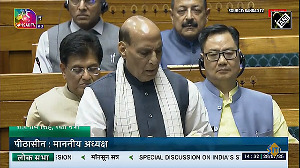.jpg?w=670&h=900) The rupee fall may constrain country's sovereign credit rating, as it will ‘exacerbate inflationary and fiscal pressures’, even though forex currency denominated debt is only around 6 per cent of total government debt, Moody's warned on Thursday.
The rupee fall may constrain country's sovereign credit rating, as it will ‘exacerbate inflationary and fiscal pressures’, even though forex currency denominated debt is only around 6 per cent of total government debt, Moody's warned on Thursday.
It also painted a grim possibility of any major gains in the rupee during the current fiscal saying that the continuing global volatility, and domestic political uncertainty ahead of the 2014 hustings will limit chances of any significant appreciation apart from further impact growth.
"Foreign currency-denominated debt is only about 6 per cent of the total government debt, so depreciation will not materially increase the sovereign's debt repayment burden.
"However, depreciation will exacerbate inflationary and fiscal pressures, both factors that constrain the country's present Baa3 rating," Moody's said in a note on Thursday.
It warned: "The rupee depreciation and its likely impact on inflation and financial stability may thus keep domestic borrowing costs high, and extend the current slowdown."
However, the steep fall will raise the cost of servicing foreign currency government debt though it cannot have any major material impact on debt repayment burden, it added.
Noting that the rupee fell 9.3 per cent between May 15 and July 15, Moody's said the currency fall could increase the debt repayment and input costs for some firms, adding to the current economic stress.
Even though non-government external debt is a relatively modest 16 per cent of GDP and it is not the primary source of financing for the majority of the private sector, the credit impact of depreciation will be greater on specific firms than on the larger economy, it added.
On the future of the rupee, it said: "Though the recent measures, including those to adjust rupee liquidity and increase foreign capital inflows may arrest the pace of depreciation, the subdued growth environment, continuing global volatility, and domestic political uncertainty ahead of the 2014 national elections will limit the chances of significant appreciation this year."
On the battering of the rupee, Moody's said the main reason for the trouble is opening up of the country's trade and financials and not a deterioration in the macroeconomic characteristics.
"This opening has resulted in occasionally steep currency adjustments to reflect the increasing interface between domestic and global trends", it said, noting that the 2008 crisis had contributed to 27 per cent fall in the rupee in FY'08, while a combination of global and local factors shaved another 12 per cent off the currency in FY'11.
The Moody's report also said that the rupee fall will not help much in narrowing down India's high Current Account Deficit which was 4.8 per cent in FY'13,
The currency pressure will jack up inflation due to rising imports costs.
Moody's said: "As domestic fuel prices transmit effect of depreciation, they will directly and indirectly contribute to headline inflation through rising transportation costs.
"However, the biggest drivers of inflation are food prices, which are largely determined by domestic output and policy trends, rather than currency value. “It is expected that currently high food prices could abate due to a good monsoon as well as a lower increase in minimum support prices, compared to previous years."
Besides, it added that the new food scheme may not increase food prices this year.
Moody's also noted that imports have been steadily increasing over the years. Last fiscal, they jumped to 32 per cent of GDP in FY13 from 15 per cent in FY03.
This will affect the input costs of a larger number of firms.
The report further notes that though the total external debt/GDP ratio of about 21 per cent compares favourably with that of many similarly rated sovereigns, the trend of rising short-term debt and declining export receipts has resulted in external vulnerability indicator, which indicates the ratio of total annual foreign debt repayments plus foreign currency deposits to forex reserves.
However, this ratio has been rising over the years and touched 65.3 per cent in FY'13 from 32.2 per cent in FY'09.
This ratio is expected to increase over the next two years.
"Should the current trend of rising external debt continue over the medium term without a commensurate increase in export earnings and reserves, the external vulnerability indicator may increase beyond the forecast levels that underpin the sovereign rating," Moody's concluded.





